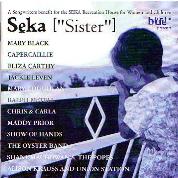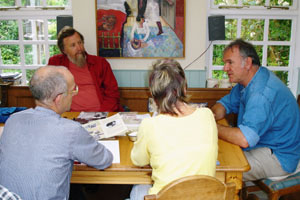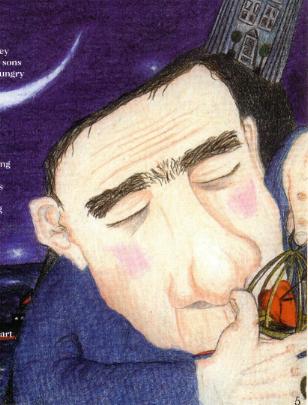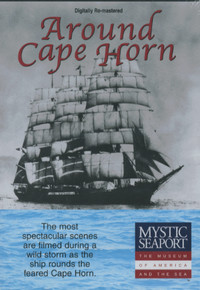RALPH, ALBERT & SYDNEY
TELLING TALES
Ralph McTell in conversation with John Beresford, January 2008.
In this third instalment, John asks about the recordings that didn't make "The Journey" box set...
|
Chalkdust
|
[Ralph] ...I recorded with John[ny Joyce] at home... I knew there were some tapes, but David [Suff] opted for well-recorded pieces on the Box Set rather than stuff that I hoped might surface. Ninety per cent were studio recordings and I had hoped for more home... but I had to surrender the choice of material. There won’t be a place for those old home recordings - they were done on a fifteen-quid tape recorder...
|
[John] I was going to mention David later, and the question of what else might be out there from the Box Set left-overs, if you like.
Yes. Well, I think, for example, I was very disappointed that we didn’t get a live version of ‘Peppers and Tomatoes’ out of it, but David rejected the recordings for reasons of heavier bass frequency, or a lot of stuff recorded with that semi-acoustic guitar and amplifier. He didn‘t like Gordoon’s mixes of that. And also, I actually think, you know, when they talk about charity fatigue, I think anyone listening to the hours and hours of McTell stuff there is, you’d get bored and worn out with it, you know, you must do. But I’m going to work on... but anyway, you carry on now.
|

This 1998 benefit album for the SEKA
Recreation House for Women and Children
includes a live version of 'Peppers & Tomatoes'
|
|
OK, thanks. Well, while we’re on David, let’s deal with it now. What occurred to me was, he must have a huge amount of material that has never seen light of day, and probably never will, with all the good reasons that you’ve talked about yourself over your career. You don’t want stuff to go out that isn’t of the best quality. That’s probably the sort of discussion you would have had with David when sorting out the Box Set. But is there a possibility that we could get from David, or with David, a list of the material, so we can actually record in writing what there has been?
|
 David Suff (top left) and Ralph (right)
at a Box Set team meeting
|
I’m sure there is, I’m sure there is a chance of doing that, because I think David kept the most comprehensive and beautifully-written notes. He’s a proper archivist, and did a fantastic job, and a lot of stuff was translated to CD and so on. But there are literally hours and hours of live music, because we now have the facility - I’m recording sort of 30% of every gig I ever do.
|
|
Perhaps in years to come when people, you know, if someone’s that interested they could go through it. I’m almost thinking of trying to find someone that could do that archival kind of research, because... something happens in live performance with certain performers, and I think I’m lucky enough to be one, where there’s a communication that takes place, which you just cannot buy or tell someone else how to do. It’s just something that happens. A good audience will produce a good performance from me, and Donard has made me very comfortable on stage with my monitoring and everything. And I think I’m probably playing as well, if not better, as I’ve ever played. And we record these things, and I get to know the songs better in performance, and I learn little nuances and try different things.
When you’re in the studio, my reasons are… I’m performing the song, and once I’ve done it a couple of times, I can’t perform it any more. I’m not sanguine, I’m not cold blooded enough to be able to do that. If you catch it in the first two takes, with all the nervousness and everything that go along with presenting a new song, you’re hoping they’ll like it, but they’re actually watching needles, they’re not listening to what’s said.
And it’s really, really hard to do, so the songs gain maturity over the years, and I’ve got, you know... on the last album, with ‘The Brighton Belle’ and ‘This Is For Those’ - I can’t even remember what we called it now - I decided I would do it with all the frailty of a new song, and not try, so they’re first takes. One of them hadn’t even been sung all the way through before, and I just did it like that, and of course they’ve developed a little bit in performance. But I like that frailty. I feel it was appropriate for the child thinking about a memory, and the young man aware of the power of being in love, and the tragi-comedy of it all, and all that. So I thought it was fine to do that.
I conceived the idea, after the success of ‘Ralph, Albert and Sydney’, and the other album, ‘Songs for Six Strings’, which was compiled from tapes of recordings from all over the world, and of course ‘Travelling Man'...
Well, ’Travelling Man’ must have been the exception, because the story there was that your sound engineer at the time was playing it the following day, and somebody said, “Well, that sounds good” - it was probably you - and of course it did sound good, so it went out as an album.
That’s exactly right. He recorded it for Steve to hear because he couldn’t make the show and, as I was listening to it, I thought that, apart from me not liking the guitar sound… that’s another thing, because it was a DI, and Donard is now getting better sounds on my acoustic instruments.
But I want six albums altogether...
This is the planned series of six...
Yeah, it’ll be called ‘Songs for Six Strings’. It’ll be six albums of live work. Well, obviously, the ‘Travelling Man’ is two albums right there; and I want to have another live album out this year. It may be the Dylan stuff, maybe some of the Woody stuff, it may be some bluesy stuff, I don’t know. And then I want another album of McTell songs that aren’t there.
|
|
We’ve now discovered a tape, which was made for a big company, but which is long-forgotten, recorded in 1971, I think, which has got live versions of ‘Chalkdust’ and stuff. I don’t know if we put a different version of ‘Chalkdust’ on the album with loads of different verses, but there’s a whole session of songs done from those early days which could comprise another album, a fifth album, of songs that appeared on ‘You Well-Meaning Brought Me Here’. They turned up in the archive.
That sounds fantastic. Interesting you mentioned that ‘Chalkdust’ has other verses. When we were doing the initial research into the lyrics, which was a couple of years before your project came to light for the book, we came across on the website an alternate verse for ‘Chalkdust’, and, of course, none of us had ever heard of it; and Leighton Thomas, whom you know very well, had a cassette recording of it with the other verse.
Good God! Well, that must be from that broadcast, probably. I’m astonished by the doggedness with which people chase these things down.
You see, ‘Chalkdust’ was an epic, really. I whittled it down into what I hoped would be an acceptable version, but I found that it was a whole book there, really, in my mind, you know, and it was just hinted at; the broad outline of it was hinted at in the actual song that actually went out, but there’s a bit more filling in in the other version.
And I was just talking to Nanna last night about an idea for a song that is working in my head at the moment, and I just cannot get it together because the implications of the idea are so big that they need to be a story. So I just think, well, I don’t know what we’re going to do with this, I’m going to have to do a collage type thing with it and just throw lines out.
But sometimes I get really… I threw up the story, as an example, of a song I have never received one request for, and I’m disappointed because I though it was good writing - and that was ‘Tous les Animaux’ - because it’s a Greek expression from ancient Greek that was translated into Latin.
|
|
Chalkdust
By Ralph McTell
Goodnight Miss Johnson calls the janitor
Finishing his nightly rounds
Continuing to clean the blackboard
She answers without looking round
Oh it's far too easy to erase
The hard-planned lessons of another day
Then she carefully packs her briefcase
And blows the chalk dust from her hands
Winds up the windows and she feeds the fishes
But forgets about the plants
Oh the biology class
And the questions that the young girls ask
Young girls seem to grow so quickly
And prove she's slowly growing old
How could they hope to understand it
Even if they could be told
No more than a name hanging in the hall
On a dusty roll of honour unread on the wall
She hears them whisper in the playground
She hears them talk in huddled groups
And those words scrawled on the blackboard
She half believes they are the truth
And no one asked the reason why
Something in assembly made Miss Johnson cry
For chalkdust settles everywhere
It dries her voice whitens her hair
Finding filling every space
But for punishment the hundred lines upon her face
There is chalkdust on the letter
That she slips beneath the door
And there are letters in the chalkdust
That daily fill the corridors
And all the lessons she's erased
Are chalkdust floating in the rays of sunset
Through the window
Through the window panes
Leighton explains the 'other verse' (highlighted above):
"I got the lyrics for the verse starting "Young girls..." from a tape recording of Ralph during my schooldays. I still have the hand-written pages, which were written, lovingly, during the early 1970s. The tape recording is long lost. I include these words whenever I sing about Miss Johnson at our local Folk Club."
|
 "...the man that has everything... captures this bird..."
|
It’s about humanity and what raises us, makes us different, I think, to animals, in the sense that wealth and power and sex and money are never enough. And sooner or later the guy that has it all will want to buy art, because it’s something he can’t properly own and contain, and, in the end, when… it was Aristotle Onassis and the opera singer, Maria Callas. The story is about them: in simple terms, about how the man that has everthing tries for… in the end has to buy art, and captures this bird with this voice and tries to keep her imprisoned...
So the ‘caged bird’ is Maria Callas?
Yes. She’s trapped by his power, and this thing, but it’s not love, and, in the end, he goes and marries the widow of President Kennedy. You know, he sails away on one of his ships and marries a rich widow in America.
|
|
Indeed – that’s the Jackie Kennedy Onassis story that we all know very well, and not many of us know the original Onassis story.
That’s right. Well, that’s what that song is about. And you think, if you don’t paint it with great big capital letters, and underline it with a brush, you know… people talk about, you know, someone said to me, “Why don’t you write an environmental…?” So I said, “Well, I don’t know I haven’t”, and someone immediately piped in and says, “Well, what’s ‘First and Last Man’?”
Well, the thing is, when you come in sideways, as I call it, come in from the ground floor, people don’t get it. And it’s a frustration to me that there’s a lot more in the song if people scratch it and have a little look deeper, you know.
But anyway, that’s what I was saying to Nanna. I don’t know how I’m going ever to get these thoughts across for these couple of songs that I’m trying to write at the moment. They may turn out just to be stories.
But I play it, and write, and attempt to write every day, but I haven’t got anything finished, apart from ‘Round Cape Horn’, since ‘Red Sky’, really. It’s one of those… I think these things happen to you from time to time. It’ll clear, the mist will clear.
|
We’ll that’s an epic, we’re all certainly looking forward to the studio version of that one. Or indeed the live version...
Of what?
Of ‘Cape Horn’ – it’s become a great favourite.
Well, I think there’s probably a couple of… I think I might actually let them go out live because I don’t know what I would do.
I do think that possibly it would be nice to get more of a sea-faring thing, and I’m trying to find out, or I will be trying to find out, if we could secure the rights to borrow the actual film footage as a back-drop for it.
Put it out as an enhanced CD?
Yes, something like that, you know, so you can see… the actual quality of the film isn’t great, but the excitement is wonderful because of the old boy talking. But I think there might be room for manoeuvre on that, and especially as it’s on permanent rotation in New York now. I think they probably show the film constantly on board the ship, and it might be a chance to put the song on as well.
|

The story of the Peking's epic voyage inspired
Ralph's song, Around the Wild Cape Horn
|
|
But it’s all stuff to think about when I’m easing off the live work merry-go-round.
Excellent. Look forward to all of that.
Back to David for a second – what do you think we could do? Would it be OK if I made contact with David again and ask him these questions, or shall I leave that to you?
Yes, it’d be perfectly OK to get in touch with David, and just say, you know, you’ve run it past me and I’ve given it my blessing, and does David feel he can oblige? Yeah, no worries. (1)
Fantastic. We’ll take that from there. Thank you very much...
[Go to Next Tale: The Definitive Collection]
|
With thanks to Ralph for sharing his time and his thoughts.
The text of this interview is the copyright of Leola Music Ltd, and may not be reproduced without permission.
All illustrations are the copyright of their owners or publishers and are reproduced here for information only.
Thanks to Leighton Thomas for the 'other verse' from 'Chalkdust'; and to Leola for permission to use the photograph of David and Ralph.
|
|
(1) Postscript.
I wrote to David, as Ralph suggested. David replied:
"I do have lots of notes on all the material I listened to for the Ralph project. As Ralph said they are all hand written and to be honest I don't have the time to type them out for you. Most of the material will be drawn from sound desk live tapes. It would be possible to compile a typical tour set from the notes, but I'm not sue there would be much point in listing all the live sets I listened to when compiling the box.
"Sorry to pour damp water on your idea, to be honest I feel all these tapes are Ralph's property and publishing a list, no matter how incomplete, will encourage more correspondence and requests for copies. Personally I'd much prefer that Ralph consider releasing a few more gems from these archives and feel that would be a better use of resources."
To which I responded:
"I accept your point that publishing such information will inevitably lead to unwelcome correspondence requesting copies of the recordings, and I am therefore happy to let the matter rest here. We (the fans) will just have to wait and see if Ralph authorizes further releases from the archive."
|



